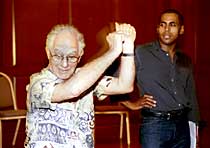Chekhov Theatre Ensemble does everything
other arts-in-education programs do: instruct, nurture and inspire.
But what makes this Fort Greene-based program different is that
it does this not only for the children, but also for its teaching
artists.
"Teaching is what they do; artists is who they are,"
says artistic director Floyd Rumohr. "We provide performing
opportunities for our teaching artists because without this support,
they won’t reach a certain level of artistry and teaching skill."
That performing opportunity was provided in May by a series of
workshop readings of Nobel Prize winner Dario Fo’s political
farce "We Won’t Pay! We Won’t Pay!" in Manhattan and
Brooklyn. The readings were directed by Robert Kalfin, who first
produced the play at his Chelsea Theater Center in 1980.
The play imagines what might happen when a group of women pilfer
produce from a supermarket, and one of these women, Antonia,
tries to hide the theft from her self-righteous husband by stuffing
the stolen goods under her friend Margherita’s dress and declaring
her pregnant. In the fine tradition of Burns and Allen, or Lucy
and Desi, the two women fool their frazzled husbands, Giovanni
and Luigi, eventually finding them accomplices in larceny.
Kalfin says that directing the play becomes an educational exercise
because of its "unique style and form." He came up
from Florida to help Rumohr because he felt that "what [Rumohr]
is doing is very important for the survival of theater."
"The fact that people are learning the practice and value
of theater means that we will have audiences in the future,"
he says. "[Theater] is a healing art because of what it
does for us. It feeds the soul of society."
Rumohr founded the Chekhov Theatre Ensemble in 1994 and named
it after Michael Chekhov, a nephew of playwright Anton Chekhov
and an actor, teacher and director himself. Considered one of
Stanislavsky’s most brilliant pupils, he came to the United States
in 1940 and established his own school, the Chekhov Studio, based
on a whole approach to actor-training using the body and movement.
"In education it’s called kinesthetic," says Rumohr.
"Fifty percent of children are kinesthetic learners. Speech
and movement processes should be intrinsic to the world view
of literacy."
The program has reached children in New York City, Long Island,
Westchester County, the Lee County school district in Florida
and most recently, Bache Martin, a school in the Fairmount district
of Philadelphia.
Rumohr says he goes through an extensive process before selecting
a school for collaboration.
"We have to feel comfortable working with each other,"
he says. "We look to see if the school has resources as
well as intent, and will give professional development and reflection
time. The school must see the program as a viable academic experience."
Teaching artists visit schools once or twice a week and teach
rehearsal skills and technique in what Rumohr calls "sustained,
sequential theater instruction." They make use of existing
text, create their own script or modify an existing text.
"One third-grade class used Roald Dahl’s ’Matilda,’ but
there wasn’t enough dialogue, so we created it," Rumohr
says.
This year at PS 145 in Bushwick, each of four classes in grades
3 to 5 acted out one scene from "Macbeth." The children
worked with percussion instruments with their music teacher and
created their own scenery, props and clever costumes with red
gloves to represent blood, and witches’ masks with eyes to show
that the witches can see into the future.
Rumohr believes the program is beneficial not only for students,
but also for teachers.
"It allows children to excel where they previously didn’t.
It’s good for teachers to see kids responding in new ways and
good for kids to see teachers in the role of learners,"
he says.
April Cantor, who played Antonia, is also Rumohr’s co-teacher
at PS 145. She remembers one girl, shy and not very popular,
who wasn’t happy performing on stage and decided to help with
the props instead.
"She took full responsibility," says Cantor. "She
found her niche backstage but more important, she knows she can
be good at something." Cantor says she observed a change
in manner, dress and the way this girl interacted with her peers.
Georgia Southern-Penn played Margherita, and last year worked
with two Long Island schools: a mixed group of children from
Herricks Middle School and Viscardi School for children with
physical and learning disabilities.
The children acting with children who couldn’t speak learned
to work with voice boxes. Others learned to push wheelchairs.
"They had to learn how to work together," says Southern-Penn.
"They were great problem solvers."
Interestingly, it was the students with disabilities who had
previous performing experience that served as mentors.
"They motivated the other kids," says Southern-Penn.
More importantly, she said, "They learned that they were
all alike."
In March 2000, Chekhov Theatre Ensemble moved into 138 South
Oxford St., a Fort Greene building housing 19 arts programs,
including the Kings County Shakespeare Company and Roots &
Branches, a Jewish culture organization.
In this building Chekhov Theatre Ensemble teaching artists train,
rehearse and perform workshop readings of plays like "We
Won’t Pay! We Won’t Pay!" which are open to the public.
For more information, call (718) 398-2494 or visit www.chekhovtheatre.org.

























